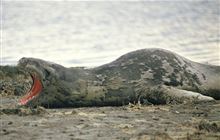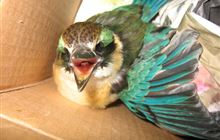Suspected dog attack on leopard seal
Archived content: This media release was accurate on the date of publication.
Introduction
DOC is seeking information about an injured leopard seal believed to have been attacked by a dog in Porirua at the weekend.Date: 20 August 2018
Rangers were called to Ngāti Toa Domain on Saturday where there was evidence of an attack. The 2-metre seal was later seen resting at Mana Marina with a badly bloodied face.
Biodiversity Ranger David Moss says the welfare of the seal - and its location – is DOC’s primary concern.
“The seal was last seen swimming into Porirua Harbour on the incoming tide late on Sunday.
“We are keen to know if it comes to shore again, so we can protect it and ensure it can rest and recuperate.
“Due to its size, vets are unable to treat this animal for its injuries without sedation. Therefore, the best we can do is ensure it is not harassed again if it comes ashore.”
DOC’s other priority is finding the dog – which may also be injured – and establishing if an offence was committed under the Dog Control Act 1996, or the Marine Mammals Protection Act 1978.
Leopard seals are top predators, usually found in Antarctic waters but are becoming more common on New Zealand coasts. They have large, powerful jaws and can inflict severe wounds.
“In a tussle with a predator like this, it’s likely the dog was also injured. Diseases can be transferred between seals and dogs, so the dog may be at risk of a nasty infection,” David Moss says.
Even though the seal was injured in an off-leash area, dogs are still expected to be under control. It is an offence to be the owner, or person in possession of, a dog that attacks protected wildlife.
The dog owner could face penalties of up to two years imprisonment or a fine of up to $20,000, and a destruction order for the dog.
Laura Boren, DOC Marine Science Advisor, says owners should always have control of their dogs on the coast, whether on leash, or off.
“There is always a chance of encountering and disturbing wildlife. Penguins, nesting shore birds, fur seals, or the much larger sea lions and leopard seals are becoming more common on our coasts.
“To prevent this kind of tragic event, always check the rules before you go, keep an eye out for wildlife and always carry your leash. Make sure you can recall your dog – if it doesn’t recall immediately and consistently on command, consider getting some obedience training.”
Leopard seals are easily identified by their long slim bodies and disproportionately large head. They have massive jaws, impressive teeth and a wide gape giving them a snake-like appearance.
People should phone 0800 LEOPARD (0800 237 7273), run by LeopardSeals.org, to report all leopard seal sightings around the New Zealand coastline and any information on this incident. The public can also call DOC (0800 DOC HOT) with any reports of wildlife being harassed or injured.


